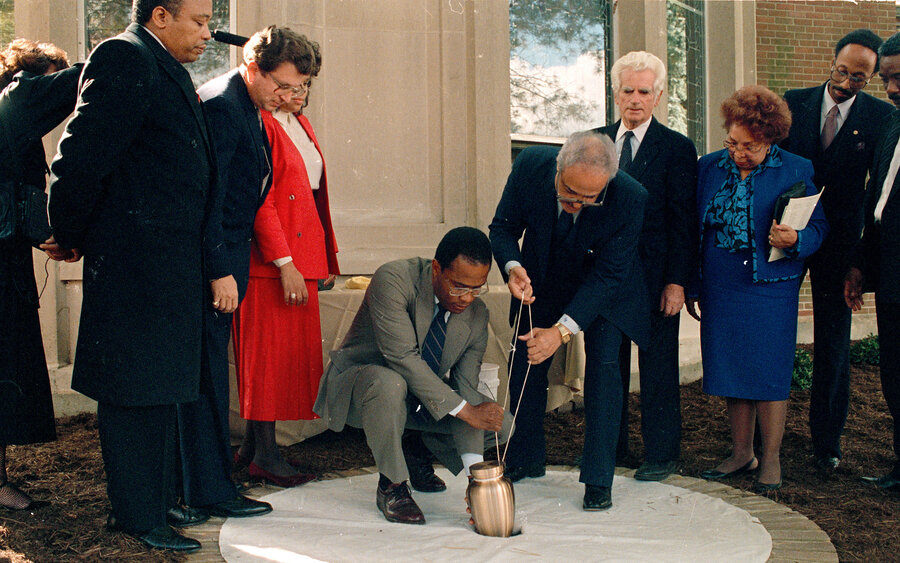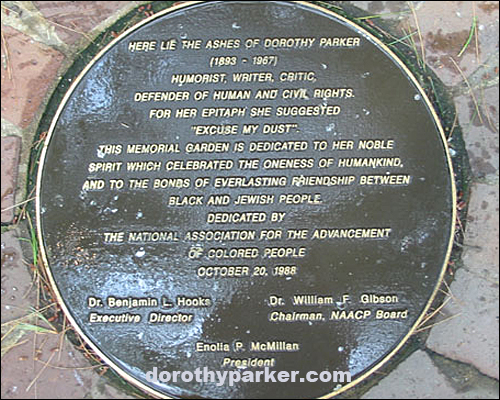A few favorite attributed quotes from Dorothy Parker (wiki):
“Their pooled emotions wouldn’t fill a teaspoon.”
“Their pooled emotions wouldn’t fill a teaspoon.”
“You can lead a horticulture, but you can't make her think.”
“I’d rather have a bottle in front of me than a frontal lobotomy.”
“I require three things in a man: he must be handsome, ruthless, and stupid.”
August 21 is the anniversary of the birth in 1893 of American humorist, literary critic, and writer Dorothy Parker (wiki, biography.com) (1893-1967), born Dorothy Rothschild in West End, New Jersey. Parker grew up in New York City and in her twenties worked on the magazine Vanity Fair with Robert Benchley and Robert Sherwood. With them, she founded a legendary writer's luncheon group known as Algonquin Hotel's "Round Table" (wiki), (PBS) which ultimately included James Thurber, E.B. White, Ogden Nash (my personal favorite Nash here), and Ring Lardner.
After 1927, Parker published incisive book reviews in her "Constant Reader" column in the New Yorker and made her literary mark with a series of poignant short stories about the cruelty and absurdity of city living. Later, she collaborated on several screen plays, including A Star is Born(1935), and served as a war correspondent in the Spanish Civil War. Her successes, including two Academy Award nominations, were curtailed as her involvement in left-wing politics led to a place on the Hollywood blacklist.
“Men seldom make passes at girls who wear glasses.”
“One more drink and I’ll be under the host.”
"That woman speaks eighteen languages and can’t say ‘no’ in any of them."
"That woman speaks eighteen languages and can’t say ‘no’ in any of them."
“It serves me right for putting all my eggs in one bastard.”
Oh, life is a glorious cycle of song,
A medley of extemporanea;
And love is a thing that can never go wrong;
And I am Marie of Roumania.
"If all the girls who attended the Yale prom were laid end to end, I wouldn't be a bit surprised."
"It's not the tragedies that kill us, it's the messes."
My land is bare of chattering folk;
the clouds are low along the ridges,
and sweet's the air with curly smoke
from all my burning bridges.
By the time you swear you’re his,
Shivering and sighing,
And he vows his passion is
Infinite, undying -
Lady, make a note of this:
One of you is lying.
If you have some time, watch this - The Ten-Year Lunch; Wits & Legends of the Algonquin Round Table (Complete):
Dorothy Parker's memorial and the story of her remains - here's the short(ish) version:
Four suicide attempts never succeeded for Dorothy Parker. When she turned 70, she told an interviewer who asked what she was going to do next, "If I had any decency, I'd be dead. All my friends are." But death waited until she was 73, and a fatal coronary came on June 7, 1967.
Within a year of her death, Dr. King was assassinated, and the Parker estate rolled over to the National Association for the Advancement of Colored People. To this day, the NAACP benefits from the royalty of all Parker publications and productions.
She was cremated, and this is where the story takes a sharp right turn. Parker was cremated on June 9, 1967, at Ferncliff Crematory in Hartsdale, New York. Hellman, who made all the funeral arrangements, never told the crematory what to do with the ashes. So they sat on a shelf in Hartsdale. Six years later, on July 16, 1973, the ashes were mailed to Mrs. Parker's lawyer's offices, O'Dwyer and Bernstein, 99 Wall Street. Paul O'Dwyer, her attorney, didn't know what to do with the little box of ashes. It sat on a shelf, on a desk, and for 15 years, in a filing cabinet.
Hellman went to court to fight the NAACP over Parker's literary estate. Hellman lost in 1972 when a judge ruled that she should be removed from executorship. Hellman was adamant that she get Parker's money, and came out of the mess painted as a racist. She was sure the will was supposed to give her a huge sum. Hellman said, "she must have been drunk when she did it."
In 1988, someone figured out that Mrs. Parker's ashes were unclaimed, 21 years after her death. New York tabloids ran stories and readers sent in letters about what should be done with the dust. But the NAACP stepped in and took the box from Paul O'Dwyer's drawer. The NAACP built a memorial garden at the national headquarters in Baltimore, and interred the ashes there.
From Christopher Hitchens' 1999 Atlantic article on Parker: Rebel in Evening Clothes:
A small memorial garden was prepared on the grounds of the organization's national headquarters in Baltimore, and a brief ceremony was held at which Mr. Hooks improved somewhat on the terse line about "excuse my dust." It might be better, he said, to recall her lines from "Epitaph for a Darling Lady":
Leave for her a red young rose
Go your way, and save your pity.
She is happy, for she knows
That her dust is very pretty.
In August 2020 the NAACP removed the urn containing Dorothy Parker’s ashes, and returned it to her family members.
More at her website. The Portable Dorothy Parker for a "greatest hits" selection, and, if you'd prefer a biography, What Fresh Hell Is This?.
10 Things You Might Not Know About Dorothy Parker.
10 Things You Might Not Know About Dorothy Parker.



